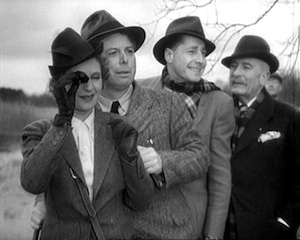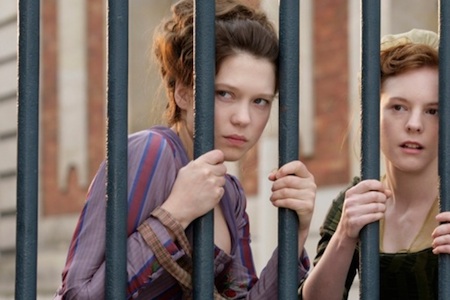His career begins in 1974 with a unprecedented two-part television interview with psychoanalytic guru Jacques Lacan. His first feature made two years later, the Dostoevsky inspired L’assassin musicien starring Anna Karina, was reviewed (rapturously and unprecedentedly) by Lacan in Cahiers du Cinema. His Les enfants terrible-inspired Les enfants du placard (1977) starring Brigtte Fossy and Lou Castel, his brilliant modern-dress adaptation of The Wings of the Dove (1981) with Dominique Sanda, Isabelle Huppert and Michele Placido,and his two documentaries about Marguerite Duras, Ecrire, and The Death of a Young English Aviator (both 1993), evidence his wide and exceedingly rarefied range. But to date only A Single Girl (1995) his day-in-the-life drama starring Virginie Ledoyen made any impact in the U.S. The latest film from Benoît Jacquot, Farewell, My Queen, may change all that. An intimate costume drama about the court of Marie Antoinette in the days of the French revolution, it features Diane Kruger as the queen. But the real star is Léa Seydoux (La Belle Personne, The Mysteries of Lisbon) as a young girl chosen to read to her majesty and help the queen’s girlfriend (Virginie Ledoyen) get out of Paris as the situation goes from bad to worse. As it opened a number of film festivals and is now being released theatrically in the U.S., it has a good chance of playing to far more than “the happy few.” I spoke to Jacquot on a recent visit to Los Angeles, where the film made its U.S. premiere at the annual “City of Lights/ City of Angels” French film festival.
Keyframe: Did you get any Japanese financing for Farewell, My Queen?
Benoît Jacquot: The Japanese weren’t there at the beginning but when it was completed they were the first to buy it. They saw parts of it, and when it was almost in a completed state they made an offer.
Keyframe: The reason why I asked is that Marie Antoinette is a very important figure in Japanese pop culture. Are you familiar with the Takarazuka?
Jacquot: No, what is that?
Keyframe: It’s an all-female Japanese theater troupe and several of the plays they do revolve around Marie Antoinette, as they were derived from the comic book series Rose of Versailles.
Jacquot: Oh yes, Jacques Demy’s film Lady Oscar was derived from Rose of Versailles.
Keyframe: In that one, Marie Antoinette was one of the characters but in other Takarazuka, she’s the lead.
Jacquot: The Japanese were interested once the film was on its way to completion. It was one of the first countries to which it was sold and one of the biggest film distributors. But it sold quite well worldwide.
Keyframe: The last French super production that I can think of that’s on this level is Chereau’s Queen Margot.
Jacquot: Perhaps. I like Patrice’s film but this is different. It’s a big production but at the same time it doesn’t have the style of a big production in the sense that audiences expect.
Keyframe: That’s because it’s an intimate story.
Jacquot: Exactly. It’s a psychological study more than a historical film. And that’s because it’s about intimate relations—between the Queen and the young girls who serve her.
Keyframe: Being a kind of ‘backstage story’ in that it’s backstage at the French Revolution, I was reminded of Rivette. That kind of theatricality.
Jacquot: For me the mode of the film is closer to Renoir.
Keyframe: The Golden Coach?
Jacquot Maybe in some ways but more specifically The Rules of the Game. It’s the film I think about most when I make a film.

Keyframe: Well that’s interesting because the previous generation of French filmmakers loved the late Renoir above all.
Jacquot: Yes Rivette was an assistant director on French Can-Can He was as faithful to Renoir as a dog.
Keyframe: How is Rivette, by the way? I heard that he was ill.
Jacquot: Rivette can’t make films anymore. In fact he has a hard time telling one day from the other. That’s why his last film was so short. He can’t go to the movies anymore. He can’t follow them.
Keyframe: Oh that’s very sad. Tragic.
Jacquot: Yes.
Keyframe: It’s interesting that your new film Farewell, My Queen you have both Léa Seydoux
and Virginie Ledoyen in leading roles. And while they’re fairly close in age, Léa Seydoux is not playing the roles Virginie Ledoyen played a few years ago.
Jacquot: Ah, very few people know that!
Keyframe; Oh there have to be more than just you and I. Did you first see Léa Seydoux in La belle personne?
Jacquot: That and several others. People liked her right away. To me she’s very much like Anna Karina. In La belle personne she reminded me of of Anna in Godard’s Le petit soldat. That freshness. I’m sure she will have a great career.
Keyframe: It’s fascinating that you began with Lacan. Is he still an important figure in France?
Jacquot: Yes. Very important. Major. His work is very difficult. Inaccessible to may people. But over the years Lacan has become a touchstone in people’s reference to psychology. He used to be much more obscure. Now, ironically, he has become very mainstream. His formulations are talked about all the time. Even in women’s magazines.
Keyframe: I saw him lecture in New York in the early ’70s. He was most impressive and quite funny.
Jacquot: Yes, I remember when he came to New York that time. He met his old friend Salvador Dali by chance in the street.
Keyframe: From watching him give that lecture I could understand why people wanted to come to see him even if they only understood a quarter of what he was saying.
Jacquot: Ah but to comprehend a quarter of Lacan is enough!
Keyframe: Then you went from him to Duras.
Jacquot: Ah, Duras was very important to me because I worked as an assistant for her before I began making films myself. She made films for very little money all sorts of different ways. And she liked having young men like me around her.
Keyframe: She favors the soundtrack over the image.
Jacquot: She invented that.
Keyframe: You were involved with the making of India Song, right?
Jacquot: Yes.
Keyframe: And Son nom du venise dans. Calcutta Desert is India Song with different images—an empty house with no actors. Later on you made The Death of a Young English Aviator.
Jacquot: That was just before her death. She told me that story and I filmed it. She then wrote it down and included it in her book Writing.
Keyframe: And now the inevitable question: What of French cinema today?
Jacquot: For the moment is going very well. For the moment!




